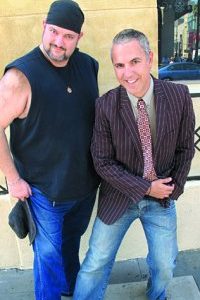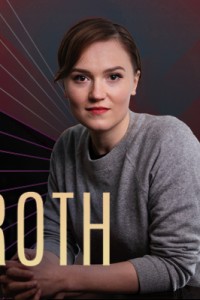Tad Williams: Things Go Away, Things Come Back

Robert Paul “Tad” Williams was born in San Jose, California, and grew up around Palo Alto. He has worked as a rock ‘n’ roll singer and songwriter, talk show host, paperboy, shoe salesman, insurance agent, journalist, technical writer, teacher, illustrator cartoonist, and employee of Apple computers.
First novel Tailchaser’s Song appeared in 1985. Williams is best known for his series novels: the “Memory, Sorrow, and Thorn” trilogy The Dragonbone Chair (1988), Stone of Farewell (1990), and To Green Angel Tower (1993); the “Otherland” quartet City of Golden Shadow (1996), River of Blue Fire (1999), Mountain of Black Glass (1999), and Sea of Silver Light (2002); and the “Shadowmarch” epic fantasy series Shadowmarch (2005), Shadowplay (2007), and the forthcoming Shadowrise (2010).
With wife Deborah Beale he is writing the “Ordinary Farm” YA fantasy series, with first book The Dragons at Ordinary Farm released in June 2009, and A Witch at Ordinary Farm and several others forthcoming.
With Nina Kiriki Hoffman he co-wrote Child of an Ancient City (1992), and his other standalone novels are Caliban’s Hour (1994) and The War of the Flowers (2003). Some of his stories have been collected in Rite: Short Work (2006), and he has written several comic books, mostly for DC Comics.
Excerpts from the interview:
“I don’t set out to write long books, and the next set of books is expressly meant to be much shorter. But in the big fantasies (I consider Otherland to be another big fantasy, even though it’s nominally science fiction), I tend to write lots and lots of characters. I have my own reasons for that, but one of the results is I feel honor-bound to give them all arcs. If you’re going to make readers invest in these smaller characters, you have to give them a payoff as well, so instead of having one or two major character arcs I have 25 or 30 character arcs in my books. People are not just spear-carriers. I like to do that, because it gives me a much more kaleidoscopic view of these big, world-changing events.
“The other reason my books tend to be long is that I have my own ideas about how you make people immerse themselves in an environment, and one of the ways is that you have to give the environment a certain amount of credibility in itself, and that means you have to spend a certain amount of time introducing it and acquainting people with it as you go along.
“But, as any writer knows, if you just stop and say ‘blah blah blah’ and dump a bunch of description (it’s called the expository lump), that doesn’t work well, and if you do this all the time it gets irritating. The scenic or historical expository lumps have to happen in the background of interactions between characters. So instead of writing a ten-page chapter with a paragraph explaining where they are, you end up writing a 12- or 15-page chapter that digresses from the foreground action to give you some feeling of the background. And maybe it introduces an extra small character into the scene who can help lead the reader to understand certain things about the environment, so you’re adding more complexity.
“If anything, that’s my greatest sin. I’m not afraid of complexity, and there are probably times when some readers just throw my books across the room. To them it feels like self-indulgence, and to me it’s how I want to tell the story.”
*
“A long time ago, I realized the only reader whose reactions I can actually rely on is me. Anybody else, I’m just creating an ‘average reader’ and trying to guess what they’d like. But I know how I feel, so what I’m essentially doing is gambling that there are a certain number of people out there who are similar to me in my reading. I may want more detail, more subtlety, more complexity, or have more patience for the irritating sides of those things than the average reader. I may have more patience for my own long-windedness than the average reader would. So I have to find readers who are patient with long-winded writers!
“One of the big revelations I had in the field when I began to meet people is that while some of them may seem to be doing cynical commercial writing, they’re usually not: this writer is totally sincere, writing the best book that he or she can write. It’s just that to my way of thinking, what they’re interested in is very middlebrow. Jacqueline Susann was not cynical; she was not going, ‘Oh, this will get the dummies all worked up.’ She was writing the books she wanted to read, and it just happened that what she was interested in coincided with a huge part of the market who wanted thinly veiled allegories about Hollywood stars and starlets on drugs and raping each other. That was her idea of fun, and you could see that in her work. Maybe the publishers were cynical, but the writers were not!”
*
“One of the things I’m most interested in is games, and one of the places where I would love to be able to influence a game even more in the long run than I have already, is beginning to work with the idea of how you incorporate story or storyline values into a gaming situation. The reason this fascinates me is not simply the nuts and bolts mechanical problem (although that’s interesting too), but how you tell a story in an environment much more present than a book. In a sense, you’ve got fewer options. You can write anything in a book, but you have to program it if you’re going to make a game out of it.
“That fascinates me by itself, but it fascinates me even more because I think it’s probably one of the great next creative frontiers. Everybody knows how phenomenally popular gaming is, but where it’s going to be really interesting is as it expands, as gaming begins to impinge more and more on the territory of film and written fiction and things like that. It can only do that if story becomes a greater part.”
This interview and more like it in the July 2009 issue of Locus.
 While you are here, please take a moment to support Locus with a one-time or recurring donation. We rely on reader donations to keep the magazine and site going, and would like to keep the site paywall free, but WE NEED YOUR FINANCIAL SUPPORT to continue quality coverage of the science fiction and fantasy field.
While you are here, please take a moment to support Locus with a one-time or recurring donation. We rely on reader donations to keep the magazine and site going, and would like to keep the site paywall free, but WE NEED YOUR FINANCIAL SUPPORT to continue quality coverage of the science fiction and fantasy field.






